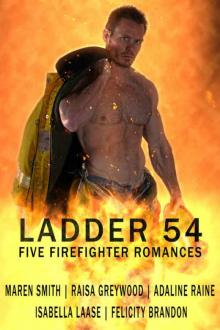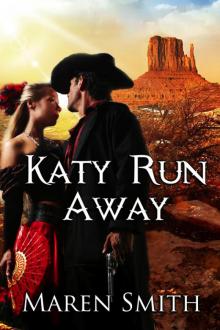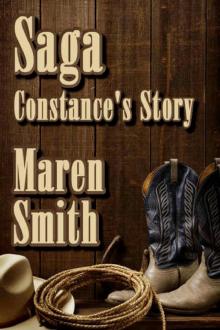- Home
- Maren Smith
Binding Brinley (Captives of Pra'kir Book 1) Page 2
Binding Brinley (Captives of Pra'kir Book 1) Read online
Page 2
Taking up his place beside her again, the doctor picked up the hypo-injector.
The man in the chair spoke again, a calm word that made the doctor’s impatient frown deepen. The look the doctor gave her was filled with blame, but after only the barest hesitation, he put the hypo down and picked up the swab. He pointed at her, a warning delivered wordlessly and with only one finger, then opened the swab and reached for her head.
“Wha’s tha’?” Brinley tried to duck his hand, but he clamped onto her forehead, pinning her to the pillow with ridiculous ease. She felt the cool sting of liquid brush behind the lobe of her left ear before he once more picked up the hypo. Drugs or not, she felt her first twinge of fear as he covered the spot with the business end of that unknown implement. “Wha’ is tha’?”
It bit with all the severity of a hungry mosquito, but the clout of a migraine-intensity headache followed within seconds. Unable to move, not even the smallest twitch, all she could do was suck in a pained breath. As fast as it had attacked, the headache faded and she sighed, the whole of her unresponsive body not moving as she sank back into the haze of her highly drugged calm.
With little more than a look and a wave of two fingers, the brooding man in the corner sent both the doctor and his assistant from the room. Hooking his sleeve, he looked at his watch and then settled back to wait. Brinley must have dozed. One minute, she was watching him in his chair, and in the next, she startled to find him standing over her, obnoxiously tapping on her forehead until her eyes blinked open.
“Do you understand my words now?” he asked, neither smiling nor unpleasant.
Trying without success to bring wetness to her mouth, Brinley ignored the question. “Who are you?” she slurred instead.
The fingers of one hand drummed lightly upon the rail of her hospital bed, not far from her wrist restraints. She made a mental note to be pissed about that, just as soon as she got her senses back.
“Rowth Lashat,” he answered. “General Magistrate for the Superior Court and the judge to whom you have been assigned. You crashed in the waters just off the beach in Endermere. You are also incredibly lucky to be alive. If not for the swift reflexes of either an incredibly brave or equally stupid fisherman, you wouldn’t be. May I have your name?”
Her tongue passed sticky as glue across lips that did not moisten. “Where’m I?”
His fingers drummed again. The chiseled line of his clean-shaven jaw clenched; otherwise, his expression did not change. “I just told you. Our city is called Endermere. It is the capital of the south-eastern coast on the Grevian continent.”
“No,” Brinley interrupted, licking her lips again. “No, I mean… where am I?”
Again, that tic of muscle leapt along his jaw. For all that he might look human, it wasn’t until he reached for her face, and she saw the sheer size of his thick-fingered hand that Brinley realized how much larger he was compared to her. The room and everything in it was relative to his size, but when he cupped her chin, turning her face to force her eyes to his, even drugged as she was, Brinley felt dwarfed by him. Once he had her attention, he released her chin and let his hand rest upon the bedrail.
“Which do you mean?” he asked, calmly enough. His already sharp black eyes locked on her even more intensely. “Galaxy, solar system, or planet?”
“Planet,” she mouthed, too weary for sound.
He replied, “Pra’kir.”
“Sun… name…”
“What’s the sun’s name?” When she nodded, he drew a sharp breath through his nose and pretended to think about it. “Well, off hand, I believe we call it ‘the sun’. Would you like to try answering some of my questions now?”
She shook her head and the whole room swayed. “It has to have a name. All stars have names. What’s the name?”
His cool expression never altered. His head canted to one side. “And the name of your sun would be…?”
She rolled her head to look at him, her mouth falling open to answer before she caught herself. The Earth’s sun, Sol, had a name the same way the planet did. It was a description, not a title. It wasn’t even individualized since ‘sol’ was also used as a time measurement on Mars. “My leg hurts,” she said instead.
A corner of his mouth curled in the faintest of smiles. “No, it doesn’t. You’re on an inhibitor.” He gestured to something on the wall above and well behind her pillow. Unable to move, she couldn’t see any part of it, and she was too tired to try more than once. “All electrical activity coming to and from your brain is being sanitized by that machine. It is the reason your heart is beating, your lungs are drawing breath, and it allows you to speak because I was hoping you might answer some questions. I’ll admit, that’s not going quite as anticipated. Indeed, the only reason you are awake at all is because I have programed you to allow it.”
Brinley looked down at herself, at all the blotches of discolored swelling that covered her starting with her broken feet and ending with the cuff on her wrist. She looked at him again.
“You’re welcome,” he said wryly. “Why am I sharing this with you, you might ask? Only to illustrate that it is impossible for you to feel any pain. From the neck down, at least, I have chosen to sanitize those impulses.” He paused to give her a chance, and then even more wryly repeated, “You’re welcome.”
“I hurt,” she argued.
“Not from the neck down, you don’t,” he repeated. “The language translator was injected above the sanitation line. I apologize for the necessity, but the headache should have passed by now and without it, we would not be having this… scintillating conversation.” He shrugged with the dark lines of his eyebrows. “Taking a cue from the immortal wisdom of my long-departed mother, you can’t have everything. Now, for the record, might I have your name?”
She gave the manacle that bound her right hand to the bedrail a pointed look, before returning her stare to him. “Am I a prisoner?”
“All right,” he said, clearly approaching the end of his patience. “Let’s operate from the assumption that this little misunderstanding we seem to be having might well be my fault.” He tried again. “My name is Rowth Lashat. General Magistrate,” he enunciated, as if that should carry some meaning for her. “The judge,” he enunciated that word too, “assigned you to me. It is my job to ask the questions and your job to answer them. Now that we have that cleared up—”
“No,” Brinley slurred.
As if unsure whether to be offended or surprised, he looked at her. His eyebrows very slowly arched. “No?”
“You’ve got no right to imprison me.” Shaking her head made the room spin. “Name, rank and birthdate. That was good enough for the Geneva Convention. It’s good enough for you.”
“Geneva Convention?” Bracing his elbows on the left-hand rail, he leaned over her. “What is that?”
“The rules that once governed how prisoners of war interacted with their enemy captors.”
“Interesting. We don’t take prisoners of war.”
She swallowed, fighting the weighted sleepiness and wishing the room would stop moving. “You execute them on the battlefield? How barbaric.”
“I never said that.” He clasped his hands as he studied her, a spark of interest igniting in the midnight depths of his eyes.
“You said…”
“We lop off both hands and send them home, unable to continue fighting.”
Even with the loopiness of the drugs in her system, Brinley was shocked. “I still have my hands.”
He half-smiled. “It does make it easier to keep the cuffs on. Although, finding cuffs small enough to fit you… I will admit that took some dedication. Why would you consider us your enemy?”
“I’m cuffed to the rail.”
“Not because you are my enemy,” he clarified.
“If you make a habit of binding your severely injured friends to their beds, I’m surprised you have any.”
A corner of his mouth curled again, but it was so fleeting, drugged as she was, she might have hallucinated that. She was having a hard time getting her eyes to focus and the heavy lids to rise after each slow blink. One minute she could have sworn he smirked. In the next, however, he was just as somber as before.
“Not that it’s any of your business, but most of my ‘friendships’ depend upon a certain degree of bondage.”
She didn’t hallucinate his next smirk or the deep rumbling chuckle that rolled from him.
“Nor is it your business how much I enjoy seeing them in restraints. However, to set the record straight, I would like to point out that you are in this situation not because you are a friend or an enemy, but because you are under arrest.”
She fought to keep her gaze locked on him. “For what?”
“To start with? Destruction of a great deal of property when your companions crash-landed their vessel on the 421 during the middle of the morning rush hour, injuring eleven individuals, killing several more, and frightening an entire populace, who have, for the last four days, been glued to their newsfeeds while waiting for signs of your species’ impending attack. I recommend you notify the indigenous people of your intentions before crash-landing on whatever planet you target next.”
Drugged or not, that pricked her temper. “I’m so terribly sorry we didn’t take time out of our extremely urgent crisis to phone in a quick, Hello from Earth. We didn’t target you. Our ship fell apart!”
“There isn’t anywhere near enough remorse in your tone for me to accept that apology. Also, the Council of Nine is equally appalled by the level of radiation that your particular part of the incident exploded throughout our immediate ocean.”
That stopped her. “Exploded?”
“Huge explosion,” he confirmed with a nod. “Just off the beach. The coral reefs have been destroyed and the environmental contamination has been extreme. We’ll be cleaning that up for years. Was it a bomb?”
If she could have moved, she would have recoiled. “We weren’t carrying bombs.”
“What was it then?”
She hesitated, but in the back of her mind, no further defiance made sense. “The fuel cells, I think. They overheated during re-entry. There must have been a crack in the casing. Maybe sudden submersion in cold water caused them to rupture. I don’t know.”
“Either way, the destruction has been severe.”
“It wasn’t deliberate,” she mumbled.
“Intent is not an excuse under the law, and the law is quite clear. You did not have permission to enter our atmosphere. You did not file a flight plan. Your ship was not licensed, nor were any of you licensed to fly it over, around, or within Pra’kir’s atmosphere. You did so in airspace reserved solely for governmental traffic, and you damaged property, violated our environment, and caused physical harm to eleven innocent bystanders, not to mention several murders. You have also not been forthcoming with pertinent information, proving yourself to be somewhat shady and dishonest, none of which will bode well when I take your case before the Council of Nine, which already believes you to be, at best, an off-world spy and, at worst, the forefront of an invading armada.”
Her head swam. She might not have been able to feel pain from the neck down, but she could feel something. Something slightly off. “No… No, we’re explorers, not soldiers.”
“Was our world your intended destination?”
She shook her head, licking her lips again. “I—I think I’m going to be sick.”
“Impossible. Was our world your intended destination?”
She rolled her head away from him, concentrating just on breathing now. Something inside her felt knotted, clogged. “I’m going to throw up.”
A tint of impatience flickered across his neutral mask. “No, you’re not. The inhibitor—”
She vomited, every muscle spasming with such force that her chest seemed to leap straight up off the bed and then she spewed, a dark bilious matter that splashed back into her own face in a mix of blood and coffee grounds. She had the most wondrous satisfaction of seeing all that calm indifference vanish from Rowth’s face before he grabbed her, catching her shoulders and the back of her neck in an effort to turn her as gently and as far onto her side as she could go, so as to avoid aspirating. She still coughed, throat burning, choking on the grit of old blood as another wave of sickness erupted from her.
Rowth swore, letting her go only long enough to slap repeatedly at the wall above her bed. A flood of languid warmth rushed up the veins of her arm as alarms went off above and behind her. Instantly, Brinley flashed back to the Reconnaissance. Her mouth tasted awful. Her throat burned from the smoke.
“I’m coming,” she slurred as she heard Sarai bellow for her down the hatch.
Elevating her head in his hand, Rowth leaned over her. “What’s your name, soldier?” he rumbled, soft and cajoling.
“Not… sssoldier.” She blinked, but it was almost more than she could manage to force her eyes open once more. Sinking. She was sinking into a mire of welcome warmth and blackness. “B-bio-Tech En’in’eer.”
“Engineer?” he repeated.
“Bi… bio… I create life,” she whispered. “I create life.”
“Don’t go to sleep.” He lightly patted her cheek, sparing no regard for the foul fluids cooling against her skin. “Stay with me, little one. Open your eyes.”
He tapped her cheek again and she fought them open once more.
“Are you good at your job?” His deep voice was soft as a lullaby, growing swiftly distant as the darkness inside her swelled once more. His black eyes became all that she could see, locked on her like some giant bird of prey.
Brinley smiled, or, at least, she tried. Outwardly, her lips barely twitched. Inside, she was grinning. Damn straight, she was good at what she did. She had graduated at the top of her class, found a job at the most prestigious facility on the planet, and promptly alienated the most highly revered and intellectually insecure scientist on staff. Hell, yeah, she was good. So damned good, they’d sent her into space to appease the scrawniest, most narrow-minded, fussbudget crackpot ever to gain governmental funding to create a new method of interstellar matter-to-fusion propulsion. She couldn’t wait to tell that idiot his fancy new fuel cells had just gotten them all arrested for gross environmental pollution.
“Lawson,” she said, as the darkness closed in between them. “My name… Brinley… Lawson.” The light faded out. The shrillness of those alarms began to fade too. “Best… point and click… operator… you’ll ever… meet.”
With that, she let the darkness pull her down to sleep.
* * * * *
“Open your eyes,” Rowth growled, only just resisting the urge to catch her by the shoulders and shake. “Open your… damn it!” He searched her neck for a pulse, but she was so bruised and swollen, all he could find was a fluttering thump so weak that he honestly couldn’t tell if he was feeling her heartbeat or his own desperate hope. He hit the call-alarm again—punching it twice in an uncharacteristic show of frustration—and then forced himself to gentle as he went back to smacking her cheek. “Brinley. Brinley, I need you to look at me.”
This was his fault. The foulness of what she’d disgorged was enough to turn his own stomach, but the sight of all that crimson and granular black erupting out of her like that had shocked him so hard his throat had closed. Never do anything in haste. Both his instructors at the Academy and his mother before them had drummed that sage wisdom into him, but with two puking spasms, seventy years of carefully crafted discipline had just gone cock-up in the bed of a dying alien.
The holding-cell door swooshed open and Doctor Xan Breckett returned with two medical assistants close at his heels.
“Where the hell have you been?” Rowth demanded.
Disgruntled as he’d been with this assignment, all surliness vanished when Breckett saw the blood. He rushed to her bedside, shoving Rowth out of the way to check the alien’s pupils. “What happened?”
“I meant to hit the call button.” Rowth grit his teeth once. “I missed.”
“You medicated her.” Breckett found the pulse point in her neck, switched to her wrist, and grunted. He palpated her swollen stomach, muttering to himself, “She’s still bleeding internally. Her gut… her stomach… something we missed, I don’t know.”
“Find your mistake,” Rowth snapped, turning from the bed in disgust. Both assistants scattered out of his way, forcing him to chase one long enough to grab a towel so he could wipe the filth from his hands. “Whatever you have to do, fix this.”
“She’s leaking blood faster than we can synthesize it—”
“Fix it!”
Breckett glared at him over the top of the dying alien. “She’s nothing but ruptured meat and crushed bone. If you wanted a miracle, you should have taken her to a priest. Gods of Na, what do you—”
Rowth turned on him. He didn’t shout. He never shouted. Instead, he got quiet. “If she dies, the Council of Nine will hold you personally responsible. I promise I will stop at nothing to guarantee that.”
Stiffening, the doctor averted his eyes, but not before Rowth glimpsed the angry subversion that ignited within them. Well, a man could think and feel as rebellious as he wanted… until he acted on it. Once that happened—Rowth could feel himself growing bigger—then they belonged to him.
“Fix her,” he commanded and for the last time. He did not repeat himself often; he would not with this doctor again. “I hold her trial tomorrow. Have her ready for sentencing by week’s end.”
“This week’s end?” Jaw dropping, all hints of insubordination abruptly washing away beneath a tide of appall, Breckett stared at him.
Not about to repeat himself again, Rowth grabbed his jacket and the tablet he’d left on the corner chair and walked out of the prison infirmary. In the back of his mind, he had no doubt Xan Breckett would do as he’d ordered. He had no choice, really. Rowth Lashat was the General Magistrate, answerable only to the Council of Nine. He always got what he wanted.
CHAPTER TWO
-->

 Ladder 54: Five Firefighter Romances
Ladder 54: Five Firefighter Romances Her Royal Daddy
Her Royal Daddy Dirty Daddies: 2020 Anniversary Anthology
Dirty Daddies: 2020 Anniversary Anthology Her Vampire Master (Midnight Doms)
Her Vampire Master (Midnight Doms) His Next Ex
His Next Ex Owning O
Owning O Daddy's Little Librarian
Daddy's Little Librarian Super Daddies
Super Daddies Stolen Moments: A Victorian Time Travel Romance
Stolen Moments: A Victorian Time Travel Romance Daddy Shark
Daddy Shark Seducing Sandy
Seducing Sandy The Locket
The Locket Build-A-Daddy
Build-A-Daddy Angel of Hawkhaven
Angel of Hawkhaven Something Has to Give
Something Has to Give Katy Run Away
Katy Run Away Jinxie's Orchids
Jinxie's Orchids Fearless
Fearless Warming Emerald
Warming Emerald Jade's Dragon
Jade's Dragon Warming Emerald: The Red Petticoat Saloon
Warming Emerald: The Red Petticoat Saloon Binding Brinley (Captives of Pra'kir Book 1)
Binding Brinley (Captives of Pra'kir Book 1) Saving Sara (Masters of the Castle)
Saving Sara (Masters of the Castle) Maddy Mine
Maddy Mine With Hearts Aflame: Valentine's Day Box Set
With Hearts Aflame: Valentine's Day Box Set Masters of the Castle: Witness Protection Program
Masters of the Castle: Witness Protection Program Have Paddle, Will Travel (Corbin's Bend Season Two Book 7)
Have Paddle, Will Travel (Corbin's Bend Season Two Book 7) Chasing Chelsea (Masters of the Castle)
Chasing Chelsea (Masters of the Castle) Saga: Contance's Story
Saga: Contance's Story Last Dance for Cadence
Last Dance for Cadence Kaylee's Keeper
Kaylee's Keeper Mischief Under The Mistletoe
Mischief Under The Mistletoe Sweet Sinclair (Masters of the Castle)
Sweet Sinclair (Masters of the Castle) Black Sheep
Black Sheep Last Dance for Cadence (Corbin's Bend)
Last Dance for Cadence (Corbin's Bend) Varden's Lady
Varden's Lady Holding Hannah (Masters of The Castle)
Holding Hannah (Masters of The Castle)